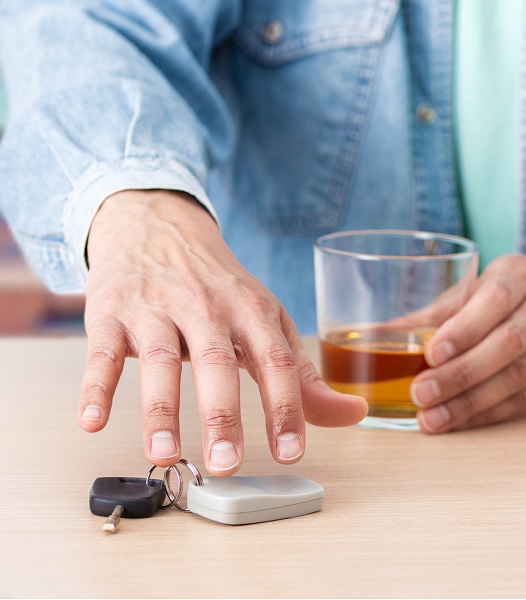Impaired Driving and Offences under the Highway Traffic Act
Driving is an essential part of our lives for most of us. Anything that impedes our ability to drive can have significant consequences. Unfortunately, there are many instances of impaired drivers on the road today, including those impaired by drugs, which is a significant problem in Canadian society.
At Hepburn Law, we assist a wide range of clients who have been charged with driving offences. Some may be facing these charges for the first time, while others may have multiple charges on their record. Our goal is to protect our clients from serious repercussions and help them regain their driving privileges as quickly as possible.

As you probably know, drunk driving is illegal in Ontario and the rest of Canada, as it violates the Criminal Code. Often, when someone is charged with impaired driving, they are also charged with blowing over the legal limit, with a blood alcohol concentration (BAC) of over .08. The police measure these readings using a breathalyzer, both at the roadside with a screening device and at the police station with a licensed Breath Technician. The Crown Attorney takes these charges very seriously, resulting in many cases going to trial.
 Impaired Driving
Impaired Driving
Impaired driving can result from different factors, including alcohol, drugs, and prescription medication. The seriousness of your charge may depend on whether this is your first, second, or subsequent charge, as well as the specific circumstances of your case.
The Canadian government places high importance on addressing drinking and driving, which causes many fatalities every year. In Ontario, the Crown Attorney adopts a zero-tolerance policy towards drinking and driving and drug-impaired driving, leading to an aggressive approach. Driving with a BAC of .08 or higher is a criminal offense according to the Criminal Code. For drug impairment, the maximum allowed THC concentration is two nanograms per milliliter of blood.
During the initial consultation, we will discuss various aspects of your situation, including the following:
1. Ignition Interlock: If this is your first charge, you may be eligible for the ignition interlock program, allowing you to install an interlock device in your car and resume driving sooner than expected. This option is particularly important for clients who rely heavily on driving, including those whose job requires it. The ignition interlock device ensures that the driver has no alcohol in their system before driving.
2. Record and Other Consequences: Taking part in the Interlock program may seem appealing, but it's crucial to understand the long-term consequences of pleading guilty, such as a criminal record, expenses associated with the interlock program, and higher insurance rates. If you've been involved in an accident, a guilty plea may also impact any lawsuit against you.
3. Circumstances of Your Arrest: The actions of the police in stopping you, asking for a breath sample, and administering the test can play a crucial role in challenging the evidence against you. It may also be possible to change your charge from a criminal offense to an offense under the Highway Traffic Act.
Impaired driving laws are constantly evolving, and the government is making it increasingly clear that drunk driving will not be tolerated. Therefore, it's vital to have an experienced criminal lawyer who can advocate for your rights and achieve the best possible outcome.
DUI Charges in Hamilton
 If this is not your first charge, your options may be somewhat limited. However, we can still discuss strategies to minimize the negative consequences and protect you from excessive penalties, such as losing your license. We understand that preserving your driver's license is usually a priority, and we will work tirelessly to identify any potential issues that can be raised with the Crown Attorney to have your charges dismissed or reduced to a lesser offense under the Highway Traffic Act. Police officers are not infallible, and they may infringe upon your Charter rights, whether it be at the roadside or at the police station. It is crucial to hire a skilled criminal lawyer to investigate whether any errors have been made.
If this is not your first charge, your options may be somewhat limited. However, we can still discuss strategies to minimize the negative consequences and protect you from excessive penalties, such as losing your license. We understand that preserving your driver's license is usually a priority, and we will work tirelessly to identify any potential issues that can be raised with the Crown Attorney to have your charges dismissed or reduced to a lesser offense under the Highway Traffic Act. Police officers are not infallible, and they may infringe upon your Charter rights, whether it be at the roadside or at the police station. It is crucial to hire a skilled criminal lawyer to investigate whether any errors have been made.
It's not uncommon for a person to be charged with impaired driving or being over the legal limit while simply being in a motor vehicle, even if they had no intention of driving. This is known as "care and control" of a motor vehicle. Many people are surprised to learn that they can face criminal charges for being in their vehicle under these circumstances. Impaired driving and surpassing the legal limit are defined in the Criminal Code of Canada and can result in a driving prohibition upon conviction. The Crown Attorney adopts a strict approach to drinking and driving in an effort to reduce the number of impaired drivers on the road.
It is crucial to take all criminal charges seriously. Impaired driving charges can lead to a criminal record, which should be avoided at all costs, especially for first offenders. Impaired driving offenses are common, but without proper representation, they could result in jail time depending on the specifics of your case. If a motor vehicle accident involves bodily harm, the Crown Attorney may seek jail time. It is also not uncommon for the Crown Attorney to pursue jail time for second or subsequent offenses of impaired driving. Therefore, regardless of the situation, seeking sound legal advice as soon as possible is vital.
New Impaired Driving Laws in Canada:
As of December 2018, new impaired driving laws have come into effect in Canada. The laws regarding drinking and driving are continuously evolving. For example, police used to require reasonable suspicion before demanding a breath sample. However, the changes grant law enforcement greater powers, making it more challenging for those facing drinking and driving charges to contest their cases.
Police now have the authority to demand a breath sample from anyone they pull over, without requiring reasonable suspicion. Additionally, you can be charged if you refuse to take the roadside test or blow into the breathalyzer at the station. Previously, a common defense against drinking and driving charges was claiming that alcohol consumption occurred immediately before driving and that it had not been absorbed. However, this defense is no longer available.
Police are now permitted to administer an oral fluid sample if they suspect drug impairment. Depending on the results, they may conduct further tests, such as a blood test.
 THC Per 1 Milliliter of Blood
THC Per 1 Milliliter of Blood
New laws are also in effect regarding having both alcohol and THC in one's system simultaneously. Being over the legal limit, with a blood alcohol concentration of 50 milligrams of alcohol per 100 milliliters of blood, combined with 2.5ng or more of THC per 1 milliliter of blood within two hours of driving, is considered impaired driving.
In Ontario, fines and penalties for impaired driving vary. A blood alcohol concentration of .05 to .08 falls within the "warn" range, resulting in administrative penalties such as a three-day license suspension and a $250 fine. Surprisingly, impaired driving does not result in demerit points in Ontario, as it falls strictly under the Criminal Code of Canada.
Alcohol affects a person's ability to drive and function in various ways. In Ontario, police employ several sobriety tests, including the standardized field sobriety test, drug recognition evaluation, and approved screening devices. Drinking and driving and drug-impaired driving are strictly prohibited for novice drivers, with zero tolerance for any alcohol or drugs in their system.
Despite a decline in impaired driving rates, Ontario, along with Quebec and Manitoba, still experiences a significant number of cases. Impaired driving remains one of the most common criminal offenses and a leading cause of death in the province. According to a study by the Centers for Disease Control, Canada has the highest drunk driving death rates among wealthy countries, with 34% of vehicle deaths attributed to impairment.
Contact Hepburn Law Today:
Being convicted of impaired driving can result in the loss of your driver's license, vehicle impoundment, criminal record, mandatory treatment programs, substantial fines, and even jail time. It is crucial to have proper representation to protect your interests.
Call us at (289) 780-1060 or contact us online using the available form to schedule an appointment. We provide representation to clients facing impaired driving and DUI charges in Hamilton, Burlington, Oakville, Brantford, Ancaster, Stoney Creek, and surrounding areas. With thorough preparation and attention to detail, we fight tirelessly for the best possible outcomes in every case.



